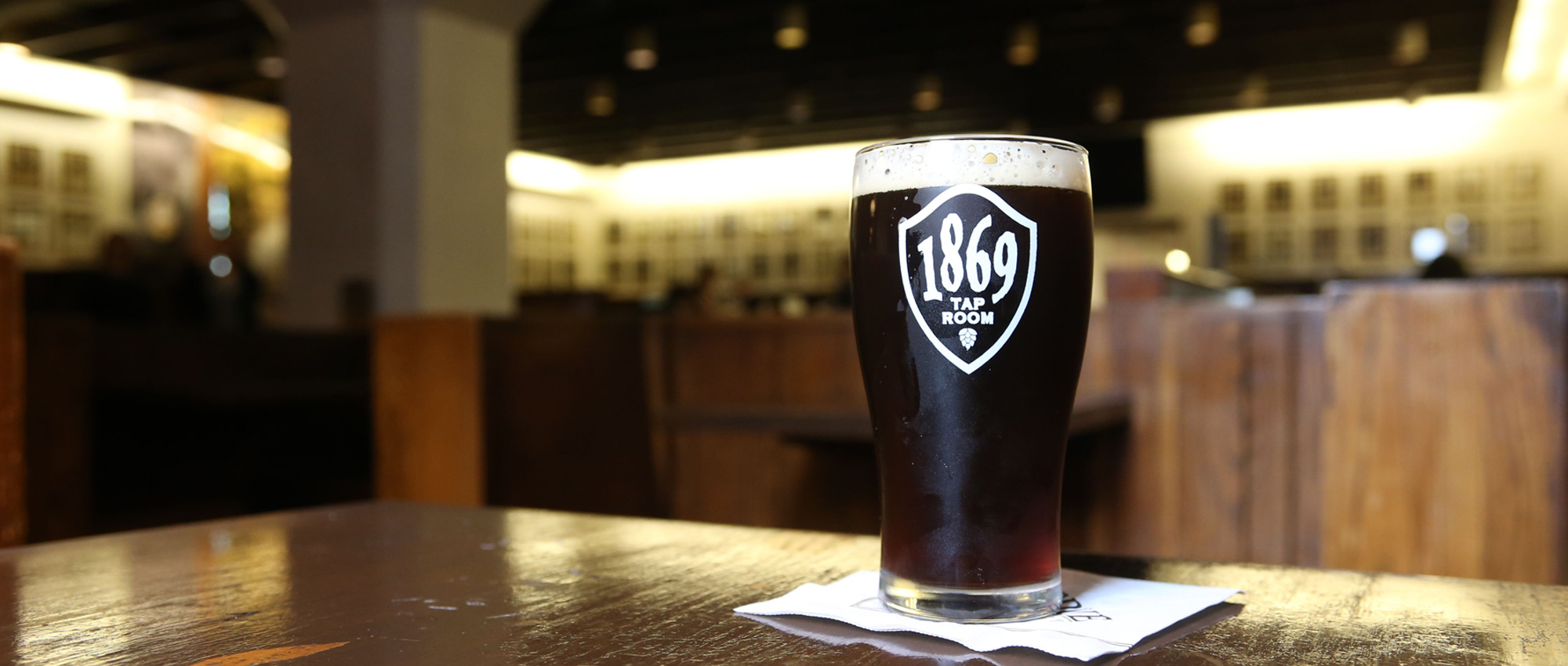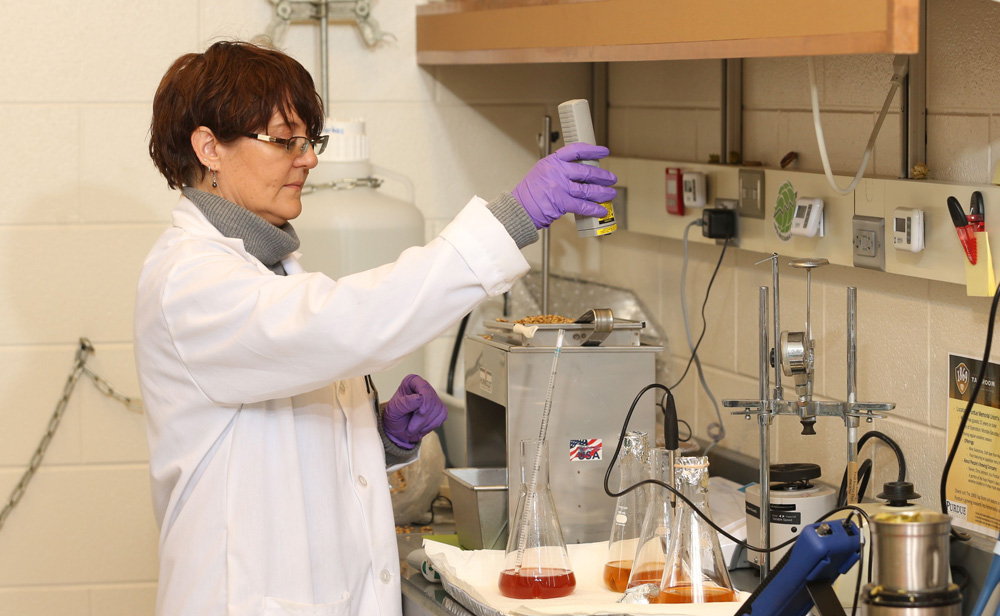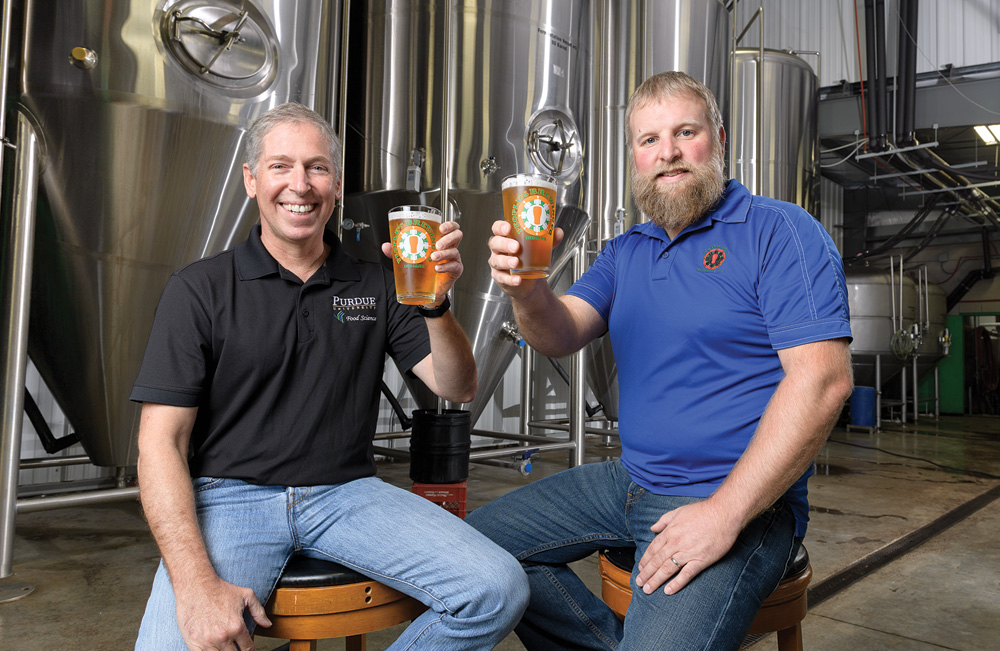
Helping Breweries Tap into Their Potential
Brian Farkas, professor and head of the Department of Food Science, loves a good pint. But he thinks the department has valuable expertise to offer craft breweries in Indiana and the Midwest. “Many brewers are not scientists,” he points out.
With the advent of a fermentation sciences program and the affiliated Hops and Brewing Analysis Laboratory, craft brewers and their industry stand to benefit from the science taking place in the College of Agriculture.
Farkas has been working to develop a fermentation sciences program in food science since he arrived on campus in 2013. He helped establish a program at North Carolina State University before coming to Purdue, where he seeks to do the same, advancing the study of how substances are chemically broken down by yeast, bacteria or other microorganisms. Fermentation is essential to the creation of diverse products, including beer and other beverages, foods like yogurt and bread, pharmaceuticals and biofuel. Indiana’s flourishing craft brewing scene, an industry with fermentation at its core, is helping Farkas realize his vision.
the takeaway
- Fermentation is a process whereby substances are chemically broken down by yeast, bacteria or other microorganisms. It is essential to the formation of wine, beer, yogurt and other products including biofuels, agrichemicals and biopharmaceuticals.
- From 2013 to 2016, the number of breweries in Indiana more than doubled, and brewing is a multimillion-dollar industry in the state.
- Brian Farkas, professor and head of the Department of Food Science, has led the creation of Purdue’s fermentation sciences program, including a Hops and Brewing Analysis Laboratory to provide research for this growing sector of the economy.
- The Hops and Brewing Analysis Lab is used to analyze the raw ingredients of beer and how those components contribute to its taste characteristics. In only its second year, the lab is analyzing hops for growers from Indiana, Michigan and Ohio.
- Purdue students have opportunities to work in the lab as well as local breweries like People’s Brewing Company in Lafayette, Indiana.
- Collaboration between the program and People’s Brewing Company produced Boiler Gold, an American golden ale, which funnels proceeds back into the fermentation sciences program.
- The new 1869 Tap Room in the Purdue Memorial Union highlights Indiana craft beer and wine and carries Boiler Gold if you want to try it on your next visit to campus.
Something’s brewing in Indiana
Brewers Association statistics recorded 63 breweries in the state in 2013. Three years later, that number had more than doubled. Brewing has become a multimillion-dollar industry in Indiana, and while it may never reach the scale of industries like production agriculture or advanced manufacturing, Farkas saw an opportunity to support this flourishing sector of the economy. He likened it to the way Purdue’s Wine Grape Team supported and developed wineries and vineyards across Indiana and the Midwest.
Farkas also hopes to give students more hands-on experience in labs and industry. “Students really want to connect the why and the what,” Farkas says. “They’re not questioning the validity of book learning, but they want to connect it with something. Students still love biochemistry, but they want to know where it fits.”
And the fermentation program is ripe with these kinds of opportunities.
Chris Johnson owns People’s Brewing Co., a popular Lafayette, Indiana, brewery, which he founded in 2009. Since nearly its beginning, Johnson says, he’s been bringing students into the brewery’s fold, offering hands-on experience they can’t get inside a classroom.
“There are tons of students on campus looking for real-life projects,” Johnson says. “We worked with them on malting sorghum; another group worked on a micro-malter, and we’ve even worked with marketing students.”
When Farkas arrived at Purdue, Johnson’s involvement with fermentation sciences deepened. He worked with Farkas to develop the program by establishing the Hops and Brewing Analysis Lab, the nexus of the fermentation sciences program.
Finding the right raw ingredients
The lab, founded in 2015, can be used to analyze the raw ingredients of beer, including hops and malts, and more recently, to assess the final product, the beer itself, by testing along a number of different dimensions that indicate its overall quality and shelf life.
Jean Jensen, a research scientist in the Department of Food Science, runs the lab. During the lab’s early stages, Jensen says, they surveyed Indiana brewers to determine industry needs. The overwhelming response: research on hop optimization was desperately required. Hops are a primary flavor component of beer, so understanding how to maximize the flowers’ potential is crucial to creating top-notch brews.

Jean Jensen, research scientist and lab manager of the Hops and Brewing Analysis Laboratory, analyzes a beer sample.
“Hops are a wonderful thing to study,” Farkas says, noting that the lab is working with farmers across the state. “It smells great, it’s complex and it’s a big flavoring agent in beer. We’re understanding when to pick that hop cone, how to dry it properly, preserve it and use it.”
“We analyze hops for the components that contribute to the taste characteristics,” Jensen says. These include moisture content, alpha and beta acids, essential oils and how quickly the hop will degrade and oxidize during storage. The lab can also be used to test malts for their characteristics.
Hops, like many crops, have a high degree of variability, as seen in the different varieties grown throughout Indiana and the Midwest. “They vary from farm to farm across different regions,” Jensen explains. “They can also vary from year to year on the same farm depending on seasonal growing conditions.”
The future goal, Jensen says, is to characterize flavor profiles for different beers — to be able to say with absolute certainty the flavors that should be present and should be absent given ingredients, style and other processing factors.
“This will let you know what flavors are present and what off-flavors are present, like when you get that skunky smell in beer.”
This next stage is imminent, she says, and will allow the lab to work more closely with Indiana breweries while maintaining relationships with the small-scale farms that supply them.
Where chemistry and craft collide
The lab’s second year saw a 50 percent jump in the number of hops it analyzed. The geographic region of hops growers utilizing the lab widened to include Michigan and Ohio. Jensen says they are hoping to develop along the same lines as Purdue’s Wine Grape Team, working closely with brewers and hops growers, as enology does with vintners and the vignerons who cultivate grapes for winemaking. That program helped Indiana earn a name for itself in the wine world, and the state is well on its way to becoming a world-class craft brewing destination, Jensen adds.
Thomas Quinn, a senior majoring in chemistry, has been working in the Hops and Brewing Analysis Lab since September 2017.
Quinn discovered his love of chemistry and brewing while working at the Indiana brewery St. John Malt Brothers. With his love of beer and background in chemistry, Quinn said the transition into fermentation sciences was seamless.
He’s proud of the role the lab plays in enhancing beer and breweries across Indiana. “I wish I was four years younger so I could take full advantage of the program and the lab.”
But the skills he’s gained in his short time in the lab, Quinn says, will serve him well on the job market, regardless of the industry he pursues. “There is a new level of intensity that comes from doing things as a professional tester,” he explains.
“There is the pressure to perform at your peak when you’re running samples that have the Purdue stamp on them.”
Farkas says this is another appealing aspect of developing the fermentation sciences program: the different ways it prepares students for a broad range of jobs and experiences.
“I’m big on fermentation sciences broadly speaking. It includes beer and wine, bread, yogurt, and cheese but also biopharmaceuticals, biofuel and agrichemicals,” Farkas says. “When you look at it all together, Indiana has a strong fermentation industry; this is Indiana’s next wave of manufacturing.”
Bring on the Boiler Gold
And that industry now has a strong research program to support it, with a Purdue-branded beer as an early collaboration. Johnson, Farkas, and many others in Food Science worked together to develop Boiler Gold, brewed by People’s Brewing Company. (Another Purdue branded beer is in the hopper, so to speak.) Johnson is pleased with the Boiler Gold product, but he’s even more proud of what the beer represents.
“We didn’t want to create a beer just to create a beer,” Johnson says. “We wanted to highlight what was going on in Food Science and we wanted to use local ingredients that had been tested in their laboratories.”

Brian Farkas, head of the Department of Food Science, and Chris Johnson, owner of People’s Brewing Company, raise a pint of Boiler Gold ale to celebrate its launch.
Proceeds from Boiler Gold are funneled back into the fermentation sciences program to further enhance its capabilities and access to new equipment, like the one-barrel brewing system recently purchased from Blichmann Engineering, a brewing supply company located just down the road from People’s.
The equipment will add another dimension to fermentation sciences to attract more students to the program. “We are going to have full fermentation capabilities,” Jensen says. “We can work on small scale recipes and troubleshoot or do a series of tests to hammer out the logistics of a final formulation.”
Farkas also collaborated with others on campus to develop the 1869 Tap Room in the Purdue Memorial Union. The Tap Room offers a venue for staff , faculty and students of all ages to mingle, while those over 21 may enjoy Indiana brews and vintages. It started as a temporary experiment, Farkas says, but was so wildly successful that it opened permanently after an upgrade in summer 2017.
Johnson worked closely with the 1869 Tap Room to train servers and install the proper equipment. It offers yet another hands-on experience for students interested in the ever-expanding world of brewing. “The fuel behind the entire thing is the educational component and the desire to grow our industry,” Johnson says.
In fall 2018 the Department of Food Science will further solidify this mission when it launches a minor in fermentation sciences. “It’s beginning as a minor and we’ll grow it into a major depending on its popularity,” Farkas says. “We’ll be training top scientists who can work, if they want, in brewing but who will also look at the salaries in biotechnology and biopharmaceuticals and go into those fields, hopefully staying here in Indiana. Purdue is a public school, and we want our graduates to stay here and better the state.”